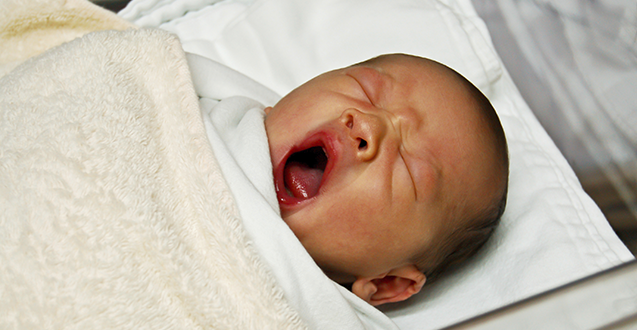Study Finds Benefits In Delaying Severing of Umbilical Cord
- July 11, 2013
- by Melissa Lawrence
I so vividly remember those first few minutes after each of my baby’s births. I remember crying in disbelief, staring at the dampened hair and red, wrinkled face of my baby… and then, craving potato chips and pizza as if I’d never eaten before in my life. Three times, I had natural child-birth and was just so grateful and relieved that the pain had stopped!

My most heart-wrenching experience, as I’ve discussed in my videos, was with my third baby Beckett, who had trouble breathing at birth and was briskly whisked away from me to the NICU. I wasn’t allowed to hold him, and returned to my room without my baby. (Beckett stayed in the NICU for 10 days with premature lungs until he was strong enough to return home and meet his older brothers. He’s now a healthy 6 year old sweetie-pie!)
Turns out that as emotionally charged as these first few minutes are for new parents, they also are significant medically in that some researches are arguing that delaying the severing of the umbilical cord can be beneficial health wise for the new baby.
Why?
Delaying the severing of the umbilical cord and thereby allowing the mother’s blood to continue to flow from the mother’s placenta to the baby through the cord, these researchers argue, helps the baby store up useful hemoglobins and iron while not significantly increasing the risk of blood loss in mothers. Delaying clamping and cutting the umbilical cord can also have a positive effect on birth weight.
This conclusion runs contrary to common practice in most hospitals, according to today’s New York Times, where doctors clamp and cut the umbilical cord less than a minute after a baby’s birth.
The analysis was published in The Cochrane Database of Systematic Reviews and examined data from 15 randomized trials involving 3,911 women and their infants. The study did not include many women who gave birth through C-sections.
One Dr. Raju, interviewed by the Times, points out American doctor hesitate in delaying cord clamping “because there can be situations in which early clamping is required — if an infant requires resuscitation, for example, or aspirates meconium, or infant stool.” In many routine cases, however, delaying cord cutting can be beneficial, Dr. Raju claimed, both in the short-term and in the long-term, since higher iron levels in babies could help reduce the risk of learning deficiencies and cognitive delay in children, which have been linked to iron-deficiency anemia in school-age children.
So this is big news for expecting moms, and certainly something to bring up with your OB-GYN before you deliver.
Expecting moms, make sure to bring up this study with your OB-GYN and get her or his views before your baby arrives!








Comments